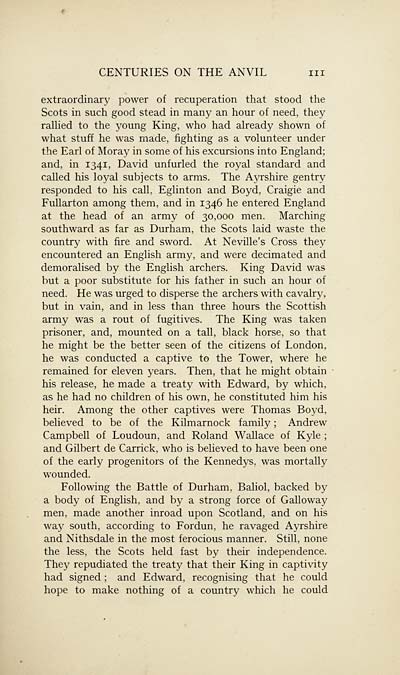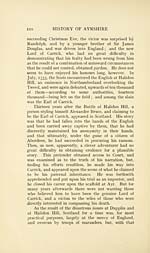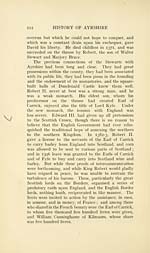Download files
Complete book:
Individual page:
Thumbnail gallery: Grid view | List view

CENTURIES ON THE ANVIL in
extraordinary power of recuperation that stood the
Scots in such good stead in many an hour of need, they
rallied to the young King, who had already shown of
what stuff he was made, fighting as a volunteer under
the Earl of Moray in some of his excursions into England;
and, in 1341, David unfurled the royal standard and
called his loyal subjects to arms. The Ayrshire gentry
responded to his call, Eglinton and Boyd, Craigie and
Fullarton among them, and in 1346 he entered England
at the head of an army of 30,000 men. Marching
southward as far as Durham, the Scots laid waste the
country with fire and sword. At Neville's Cross they
encountered an English army, and were decimated and
demoralised by the English archers. King David was
but a poor substitute for his father in such an hour of
need. He was urged to disperse the archers with cavalry,
but in vain, and in less than three hours the Scottish
army was a rout of fugitives. The King was taken
prisoner, and, mounted on a tall, black horse, so that
he might be the better seen of the citizens of London,
he was conducted a captive to the Tower, where he
remained for eleven years. Then, that he might obtain
his release, he made a treaty with Edward, by which,
as he had no children of his own, he constituted him his
heir. Among the other captives were Thomas Boyd,
believed to be of the Kilmarnock family ; Andrew
Campbell of Loudoun, and Roland Wallace of Kyle ;
and Gilbert de Carrick, who is believed to have been one
of the early progenitors of the Kennedys, was mortally
wounded.
Following the Battle of Durham, Baliol, backed by
a body of English, and by a strong force of Galloway
men, made another inroad upon Scotland, and on his
way south, according to Fordun, he ravaged Ayrshire
and Nithsdale in the most ferocious manner. Still, none
the less, the Scots held fast by their independence.
They repudiated the treat}' that their King in captivity
had signed ; and Edward, recognising that he could
hope to make nothing of a country which he could
extraordinary power of recuperation that stood the
Scots in such good stead in many an hour of need, they
rallied to the young King, who had already shown of
what stuff he was made, fighting as a volunteer under
the Earl of Moray in some of his excursions into England;
and, in 1341, David unfurled the royal standard and
called his loyal subjects to arms. The Ayrshire gentry
responded to his call, Eglinton and Boyd, Craigie and
Fullarton among them, and in 1346 he entered England
at the head of an army of 30,000 men. Marching
southward as far as Durham, the Scots laid waste the
country with fire and sword. At Neville's Cross they
encountered an English army, and were decimated and
demoralised by the English archers. King David was
but a poor substitute for his father in such an hour of
need. He was urged to disperse the archers with cavalry,
but in vain, and in less than three hours the Scottish
army was a rout of fugitives. The King was taken
prisoner, and, mounted on a tall, black horse, so that
he might be the better seen of the citizens of London,
he was conducted a captive to the Tower, where he
remained for eleven years. Then, that he might obtain
his release, he made a treaty with Edward, by which,
as he had no children of his own, he constituted him his
heir. Among the other captives were Thomas Boyd,
believed to be of the Kilmarnock family ; Andrew
Campbell of Loudoun, and Roland Wallace of Kyle ;
and Gilbert de Carrick, who is believed to have been one
of the early progenitors of the Kennedys, was mortally
wounded.
Following the Battle of Durham, Baliol, backed by
a body of English, and by a strong force of Galloway
men, made another inroad upon Scotland, and on his
way south, according to Fordun, he ravaged Ayrshire
and Nithsdale in the most ferocious manner. Still, none
the less, the Scots held fast by their independence.
They repudiated the treat}' that their King in captivity
had signed ; and Edward, recognising that he could
hope to make nothing of a country which he could
Set display mode to:
![]() Universal Viewer |
Universal Viewer | ![]() Mirador |
Large image | Transcription
Mirador |
Large image | Transcription
Images and transcriptions on this page, including medium image downloads, may be used under the Creative Commons Attribution 4.0 International Licence unless otherwise stated. ![]()
| Histories of Scottish families > Ayrshire > Volume 1 > (121) Page 111 |
|---|
| Permanent URL | https://digital.nls.uk/95195738 |
|---|
| Attribution and copyright: |
|
|---|
| Description | A selection of almost 400 printed items relating to the history of Scottish families, mostly dating from the 19th and early 20th centuries. Includes memoirs, genealogies and clan histories, with a few produced by emigrant families. The earliest family history goes back to AD 916. |
|---|

